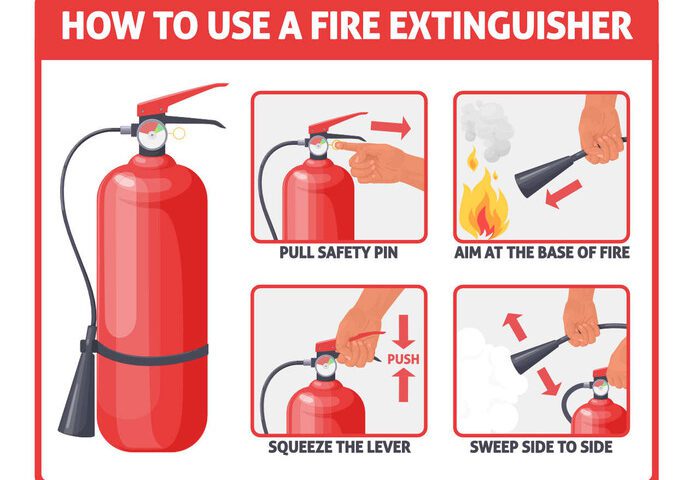How to Properly Use a Fire Extinguisher: A Step-by-Step Guide

5 Fire Safety Tips to Keep Your Home Safe
July 27, 2023
Deluge Fire Protection Systems: What You Need to Know
July 31, 2023Fire safety is a critical skill that everyone should possess, whether at home, in the workplace, or in public spaces. In the event of a fire, a well-maintained and properly used fire extinguisher can be a lifesaver. However, it’s essential to know the correct way to handle a fire extinguisher to maximize its effectiveness. In this blog article, we will provide a step-by-step guide on how to use a fire extinguisher safely and efficiently, empowering you with the knowledge to tackle small fires confidently and prevent potential disasters.
Assess the Situation
Before you even think about using a fire extinguisher, you need to assess the situation and make sure that it is safe to do so. Here are a few things to keep in mind:
- Is the fire small enough to be extinguished with a fire extinguisher? If the fire is too large or out of control, it is best to evacuate and call the fire department.
- Is there a clear path to the exit? If you cannot safely exit the area, do not attempt to use the fire extinguisher.
- Are there any people or animals in danger? If there are people or animals in the area, make sure they are safe before you attempt to use the fire extinguisher.
Understanding Fire Extinguishers
Before we delve into the usage, it’s crucial to understand the different types of fire extinguishers. There are four main classes based on the type of fire they can extinguish:
- Class A: Suitable for fires involving ordinary combustible materials like wood, paper, cloth, and plastic.
- Class B: Designed for fires fueled by flammable liquids, such as gasoline, oil, or grease.
- Class C: Meant for electrical fires involving energized electrical equipment.
- Class D: Specifically for fires ignited by combustible metals, like magnesium or titanium.
Each fire extinguisher is labeled with the classes of fires it can handle, represented by letters or pictograms. Ensure you choose the appropriate extinguisher based on the potential fire hazards in your surroundings.
Step-by-Step Guide on Using a Fire Extinguisher
Evaluate the Situation
The first step is to assess the fire’s size and the surrounding environment. If the fire is extensive, it’s best to evacuate immediately and call emergency services. Fire extinguishers are only effective for containing small, manageable fires. Additionally, ensure that you have a clear escape route behind you if the fire becomes uncontrollable.
Activate the Fire Alarm
Before attempting to use the fire extinguisher, activate the nearest fire alarm. Alerting others to the emergency will facilitate a quicker and safer evacuation.
Grab the Fire Extinguisher
Approach the fire extinguisher calmly and with caution. Always keep in mind the proper class of extinguisher required for the type of fire you are dealing with. Carry the extinguisher to the fire, holding it by the handle.
Remember PASS: Pull, Aim, Squeeze, Sweep
Pull the Pin: With the extinguisher in your hand, locate the safety pin or tamper seal on the extinguisher’s handle and pull it out, breaking the seal.
Aim Low: Point the nozzle or hose at the base of the fire. By targeting the source of the flames, you cut off the fire’s oxygen supply and effectively extinguish it.
Squeeze the Handle: Firmly squeeze the handle to release the extinguishing agent. Be prepared for the initial force of the extinguisher’s discharge.
Sweep from Side to Side: Using a sweeping motion, move the extinguisher’s nozzle across the base of the fire. Continue until the flames are fully extinguished. Keep a safe distance while doing this.
Maintain Vigilance
Even if you have managed to extinguish the fire, remain vigilant. Fires can reignite, especially if not completely smothered. Watch the area for any signs of a resurgence and be ready to repeat the extinguishing process if necessary.
Evacuate if Necessary
If you find yourself overwhelmed by the fire, if it grows rapidly, or if you run out of extinguishing agent, do not hesitate to evacuate immediately. Your safety takes precedence above all else.
Conclusion
Being familiar with how to use a fire extinguisher properly can mean the difference between containing a small fire and experiencing a devastating disaster. Remember to choose the appropriate extinguisher based on the type of fire you are dealing with, and always prioritize your safety. Regularly inspect and maintain your fire extinguishers, so they are always in optimal working condition. In the event of a fire, remain calm, follow the PASS technique, and alert others to the emergency. By mastering the use of a fire extinguisher, you can contribute to a safer environment for yourself and those around you.

